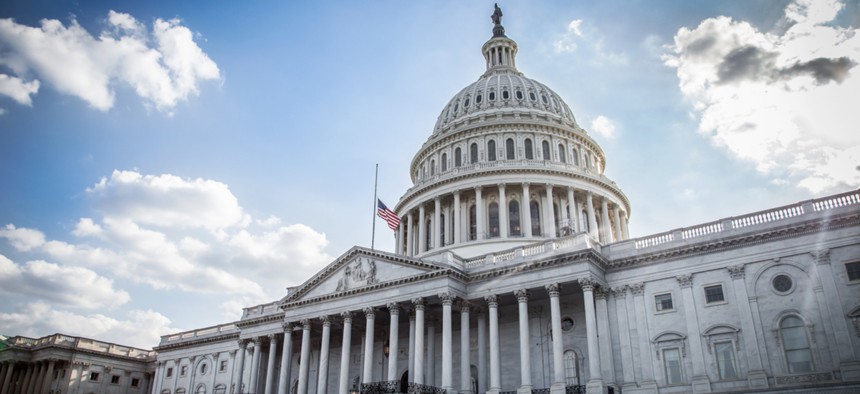Shutdown, Surveillance Deadlines Loom Over Congress

Colin Dewar/Shutterstock.com
A pair of lawmakers also proposed a pay raise for federal employees.
Three-day weekends always come with a price, which for Congress means figuring out how to fund the government and renew a controversial surveillance power before they both expire Jan. 19. So two big issues need to be resolved in four working days.
House Majority Leader Kevin McCarthy on Thursday told lawmakers to expect to vote on another short-term spending measure this week—the fourth since September. Lawmakers are still working out how to raise spending caps, avoid sequestration kicking in and figure out thornier immigration issues.
Senate Races Deadline on Surveillance Renewal
All eyes—prying and otherwise—will turn to the Senate this week, where lawmakers are racing to reauthorize a controversial internet surveillance authority before it expires Friday.
The House passed its version of the bill to renew Section 702 of the Foreign Intelligence Surveillance Act Thursday over the complaints of civil libertarians. Those members wanted to add a strict warrant requirement before law enforcement could query the intelligence community’s database of 702-gathered information for investigations.
The House vote also came after President Donald Trump seemed to criticize the surveillance bill on Twitter before reversing himself just under two hours later. Sens. Rand Paul, R-Ky., and Ron Wyden, D-Ore., have threatened to filibuster the Senate bill unless senators are allowed to debate adding a similar warrant requirement.
Time for a Raise
Sen. Brian Schatz, D-Hawaii, and Rep. Gerry Connolly, D-Va., reintroduced House and Senate versions of the Federal Adjustment of Income Rates Act, which would give federal employees a 3 percent pay hike in 2019.
Signed into Law
The president Wednesday signed the Connected Government Act into law, requiring new and redesigned federal websites to be mobile friendly and the INTERDICT Act, authorizing Customs and Border Protection to buy new screening tools to detect opioids being smuggling into the country and personnel to interpret the data the devices collect.
Goodbye and Thanks for All the Fish
After 18 years, Rep. Darrell Issa, R-Calif, said he wouldn’t run for re-election Wednesday. The former House Oversight and Government Reform Committee chairman will likely be remembered for partisan hearings but he also leaves a lasting impact on government technology through his work on FITARA and the DATA Act. Here’s a look at his tech legacy.
Another Californian, House Foreign Affairs Chairman Ed Royce, R-Calif., also announced plans to retire after this Congress last week. Royce co-sponsored a bill that would require the State Department to re-open its recently shuttered cyber coordinator’s office, which has become a model for other nations.
A Win for Zero Day Transparency
A bill requiring the White House to report how the government decides whether to disclose software bugs or keep them secret passed the House Tuesday. The bill mirrors a White House plan to increase the transparency of its “vulnerability equities process” but was introduced before the plan.
As a general rule, the government alerts industry about roughly 90 percent of the software bugs it discovers and holds onto the remaining 10 percent to use them to spy on U.S. adversaries. The government privileges disclosure when bugs are most likely to be used to hack Americans, officials have said.
The $21 Billion Breach
Breached companies could be paying billions of dollars in fines under legislation introduced Wednesday by Sens. Mark Warner, D-Va., and Elizabeth Warren, D-Mass. Under the Data Breach Prevention and Compensation Act, the credit rating agency Equifax would have been on the hook for between $14 and $21 billion for its breach, which compromised the personal data of more than 140 million Americans.
Hurd on the Slopes
One of Congress’ cyber-iest members, Rep. Will Hurd, R-Texas, will be one of three co-chairs of an Aspen Institute forum focused on cybersecurity, the congressman’s office announced this week. Other co-chairs are IBM CEO Ginni Rometty and President Barack Obama’s Homeland Security Adviser Lisa Monaco.
Coming Up This Week
On Tuesday, the Senate Judiciary Committee will hold an oversight hearing with Homeland Security Secretary Kirstjen Nielsen that could touch on the department’s cybersecurity responsibilities.
The House Homeland Security Committee will dig into the Homeland Security Department’s continuous diagnostics and mitigation program during a Wednesday hearing. The Senate Commerce Committee will examine terrorist use of social media that same day, focusing on whether tech companies have done enough to combat the problem.
The Senate Intelligence Committee will hold a confirmation hearing that day for Michael Atkinson to be inspector general of the Intelligence Community and Jason Klitenic to be general counsel in the Office of the Director of National Intelligence.
On Thursday, House Energy and Commerce will explore how the internet of things is affecting manufacturing and innovation.





